HEA102 Research Evidence in Practice: A Critique of Fish Studies
VerifiedAdded on 2023/06/10
|8
|1455
|175
Report
AI Summary
This assignment is a critique of two research articles focusing on fish consumption. The first article examines consumer perceptions versus scientific evidence of farmed and wild fish in Belgium, analyzing consumer beliefs about taste, nutrition, and health aspects and comparing them to scientific findings. It employs quantitative methods and focus group discussions to reveal that Belgian consumers often rely on emotions rather than factual data when assessing farmed fish. The second article explores the roles and responsibilities within the Irish seafood industry concerning sustainability. Using qualitative research techniques such as interviews and participant observation, it identifies factors influencing industry sustainability and emphasizes the need for responsible strategy and enforcement to enhance sustainability in the face of dwindling fish stocks. Both critiques assess the methodologies, findings, and implications of the respective studies, providing a comprehensive overview of the research evidence in practice.
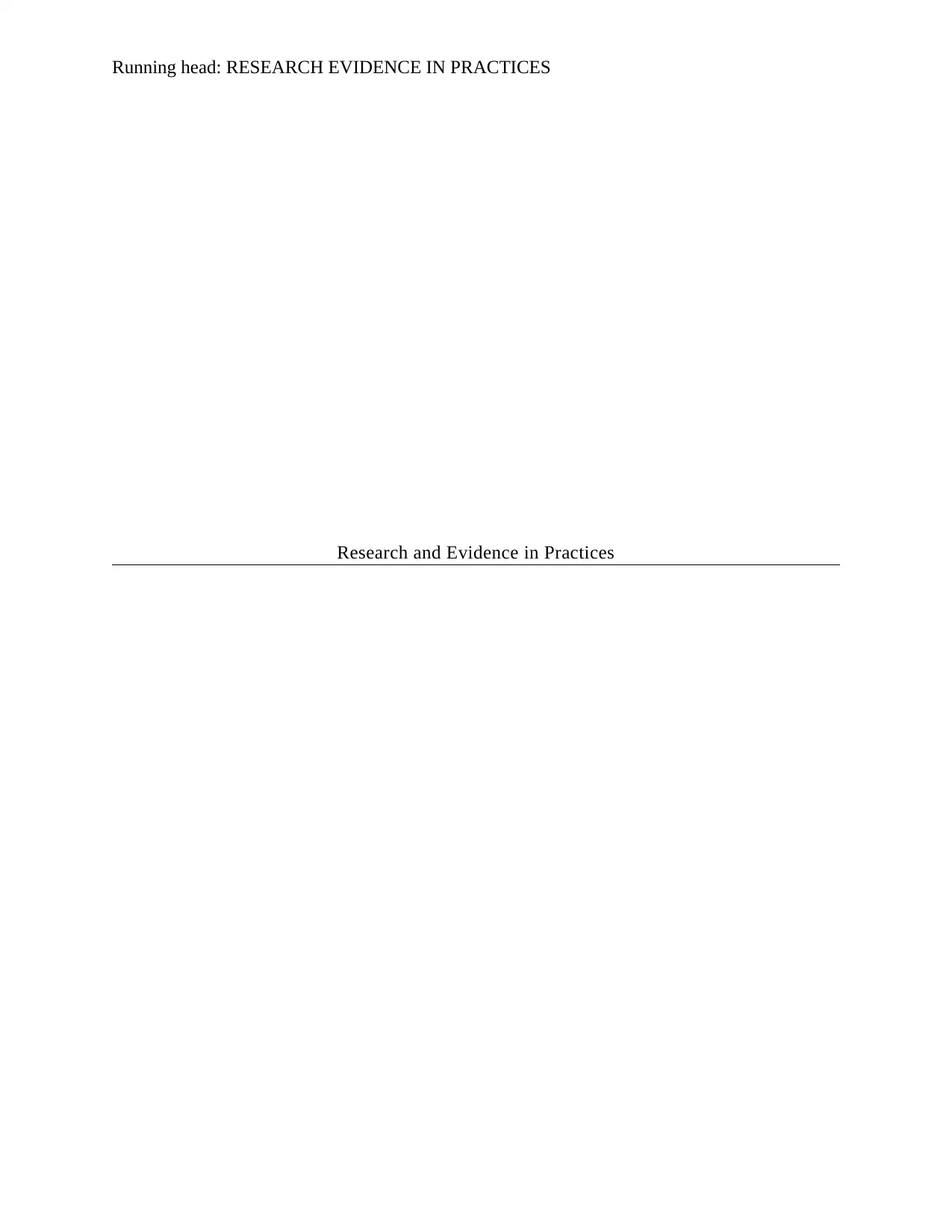
Running head: RESEARCH EVIDENCE IN PRACTICES
Research and Evidence in Practices
Research and Evidence in Practices
Paraphrase This Document
Need a fresh take? Get an instant paraphrase of this document with our AI Paraphraser
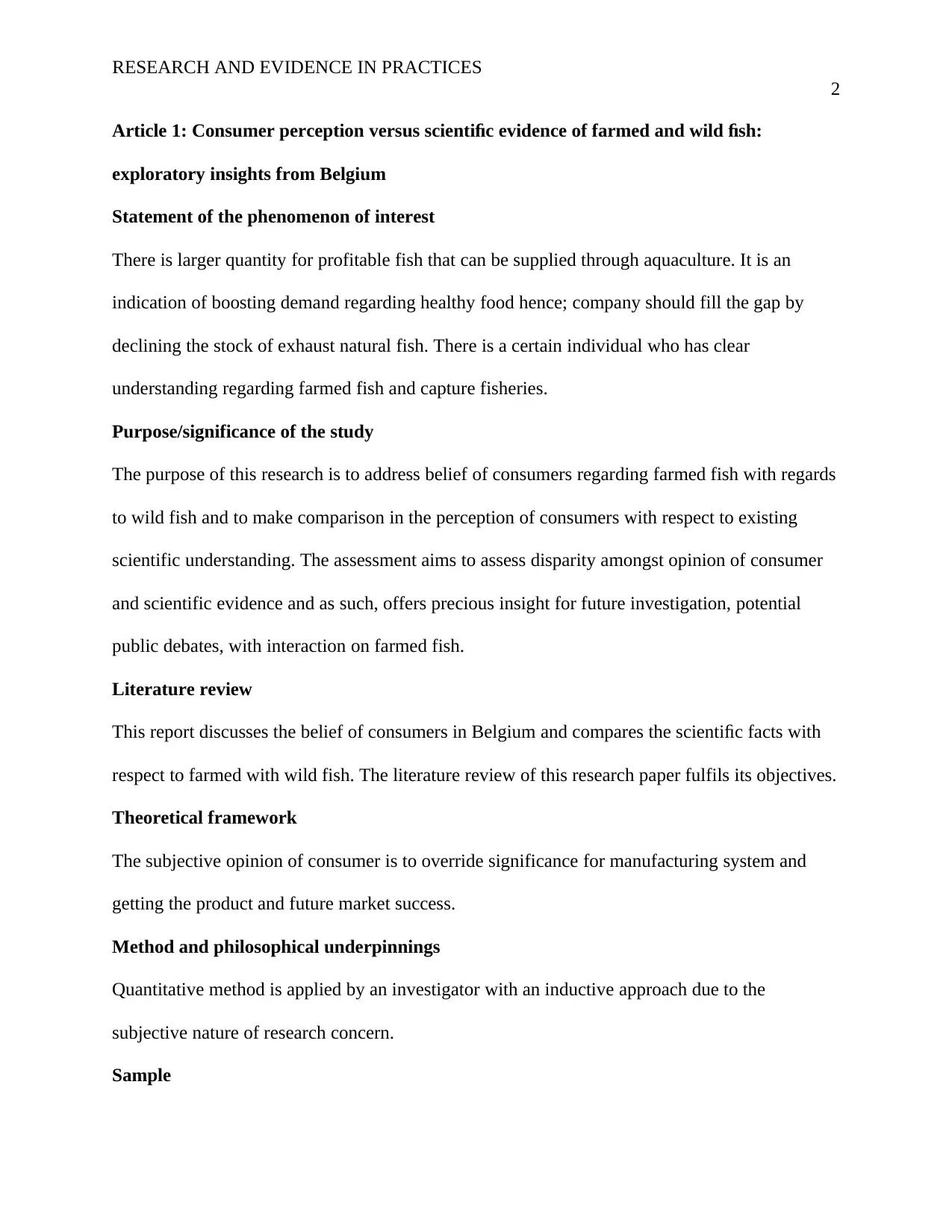
RESEARCH AND EVIDENCE IN PRACTICES
2
Article 1: Consumer perception versus scientific evidence of farmed and wild fish:
exploratory insights from Belgium
Statement of the phenomenon of interest
There is larger quantity for profitable fish that can be supplied through aquaculture. It is an
indication of boosting demand regarding healthy food hence; company should fill the gap by
declining the stock of exhaust natural fish. There is a certain individual who has clear
understanding regarding farmed fish and capture fisheries.
Purpose/significance of the study
The purpose of this research is to address belief of consumers regarding farmed fish with regards
to wild fish and to make comparison in the perception of consumers with respect to existing
scientific understanding. The assessment aims to assess disparity amongst opinion of consumer
and scientific evidence and as such, offers precious insight for future investigation, potential
public debates, with interaction on farmed fish.
Literature review
This report discusses the belief of consumers in Belgium and compares the scientific facts with
respect to farmed with wild fish. The literature review of this research paper fulfils its objectives.
Theoretical framework
The subjective opinion of consumer is to override significance for manufacturing system and
getting the product and future market success.
Method and philosophical underpinnings
Quantitative method is applied by an investigator with an inductive approach due to the
subjective nature of research concern.
Sample
2
Article 1: Consumer perception versus scientific evidence of farmed and wild fish:
exploratory insights from Belgium
Statement of the phenomenon of interest
There is larger quantity for profitable fish that can be supplied through aquaculture. It is an
indication of boosting demand regarding healthy food hence; company should fill the gap by
declining the stock of exhaust natural fish. There is a certain individual who has clear
understanding regarding farmed fish and capture fisheries.
Purpose/significance of the study
The purpose of this research is to address belief of consumers regarding farmed fish with regards
to wild fish and to make comparison in the perception of consumers with respect to existing
scientific understanding. The assessment aims to assess disparity amongst opinion of consumer
and scientific evidence and as such, offers precious insight for future investigation, potential
public debates, with interaction on farmed fish.
Literature review
This report discusses the belief of consumers in Belgium and compares the scientific facts with
respect to farmed with wild fish. The literature review of this research paper fulfils its objectives.
Theoretical framework
The subjective opinion of consumer is to override significance for manufacturing system and
getting the product and future market success.
Method and philosophical underpinnings
Quantitative method is applied by an investigator with an inductive approach due to the
subjective nature of research concern.
Sample
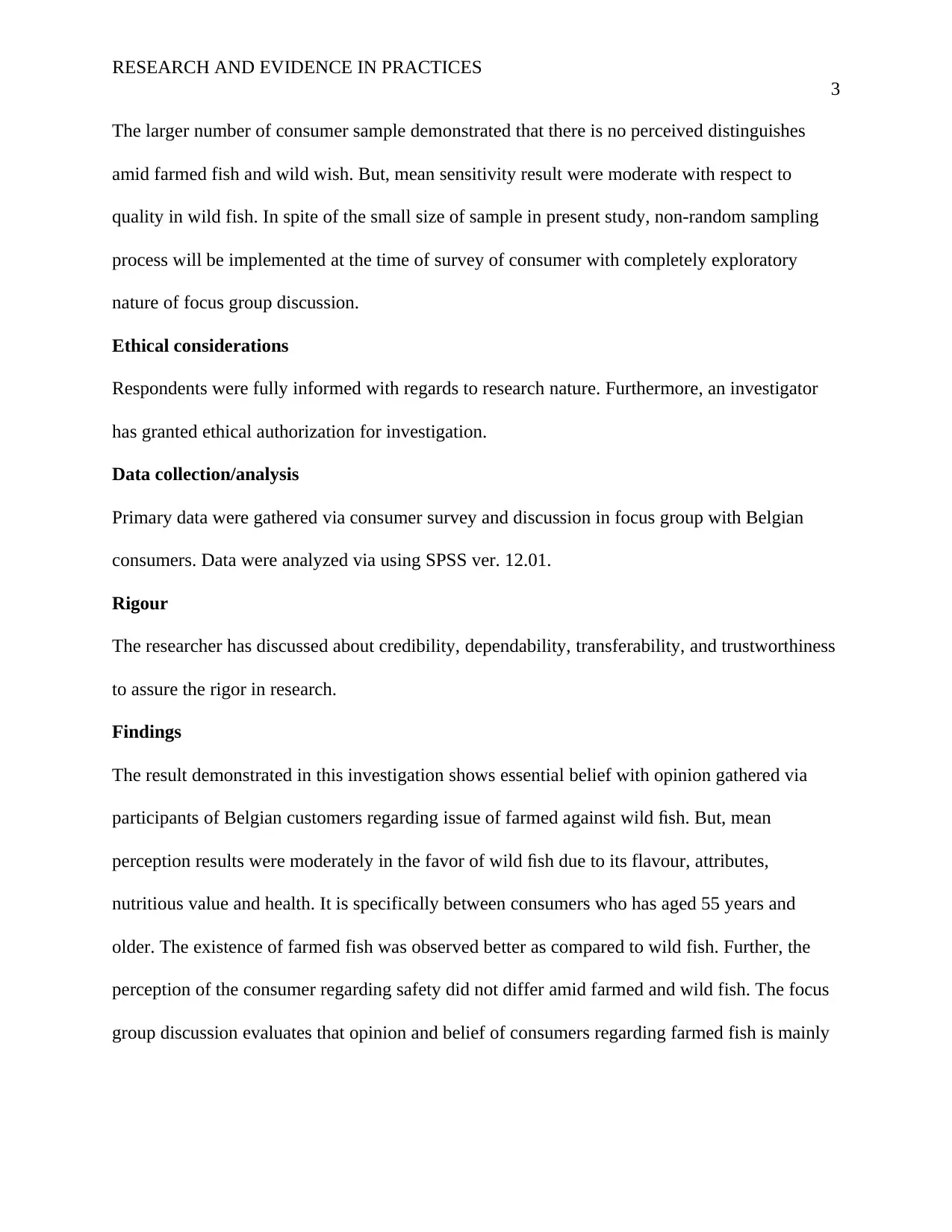
RESEARCH AND EVIDENCE IN PRACTICES
3
The larger number of consumer sample demonstrated that there is no perceived distinguishes
amid farmed fish and wild wish. But, mean sensitivity result were moderate with respect to
quality in wild fish. In spite of the small size of sample in present study, non-random sampling
process will be implemented at the time of survey of consumer with completely exploratory
nature of focus group discussion.
Ethical considerations
Respondents were fully informed with regards to research nature. Furthermore, an investigator
has granted ethical authorization for investigation.
Data collection/analysis
Primary data were gathered via consumer survey and discussion in focus group with Belgian
consumers. Data were analyzed via using SPSS ver. 12.01.
Rigour
The researcher has discussed about credibility, dependability, transferability, and trustworthiness
to assure the rigor in research.
Findings
The result demonstrated in this investigation shows essential belief with opinion gathered via
participants of Belgian customers regarding issue of farmed against wild fish. But, mean
perception results were moderately in the favor of wild fish due to its flavour, attributes,
nutritious value and health. It is specifically between consumers who has aged 55 years and
older. The existence of farmed fish was observed better as compared to wild fish. Further, the
perception of the consumer regarding safety did not differ amid farmed and wild fish. The focus
group discussion evaluates that opinion and belief of consumers regarding farmed fish is mainly
3
The larger number of consumer sample demonstrated that there is no perceived distinguishes
amid farmed fish and wild wish. But, mean sensitivity result were moderate with respect to
quality in wild fish. In spite of the small size of sample in present study, non-random sampling
process will be implemented at the time of survey of consumer with completely exploratory
nature of focus group discussion.
Ethical considerations
Respondents were fully informed with regards to research nature. Furthermore, an investigator
has granted ethical authorization for investigation.
Data collection/analysis
Primary data were gathered via consumer survey and discussion in focus group with Belgian
consumers. Data were analyzed via using SPSS ver. 12.01.
Rigour
The researcher has discussed about credibility, dependability, transferability, and trustworthiness
to assure the rigor in research.
Findings
The result demonstrated in this investigation shows essential belief with opinion gathered via
participants of Belgian customers regarding issue of farmed against wild fish. But, mean
perception results were moderately in the favor of wild fish due to its flavour, attributes,
nutritious value and health. It is specifically between consumers who has aged 55 years and
older. The existence of farmed fish was observed better as compared to wild fish. Further, the
perception of the consumer regarding safety did not differ amid farmed and wild fish. The focus
group discussion evaluates that opinion and belief of consumers regarding farmed fish is mainly
⊘ This is a preview!⊘
Do you want full access?
Subscribe today to unlock all pages.

Trusted by 1+ million students worldwide
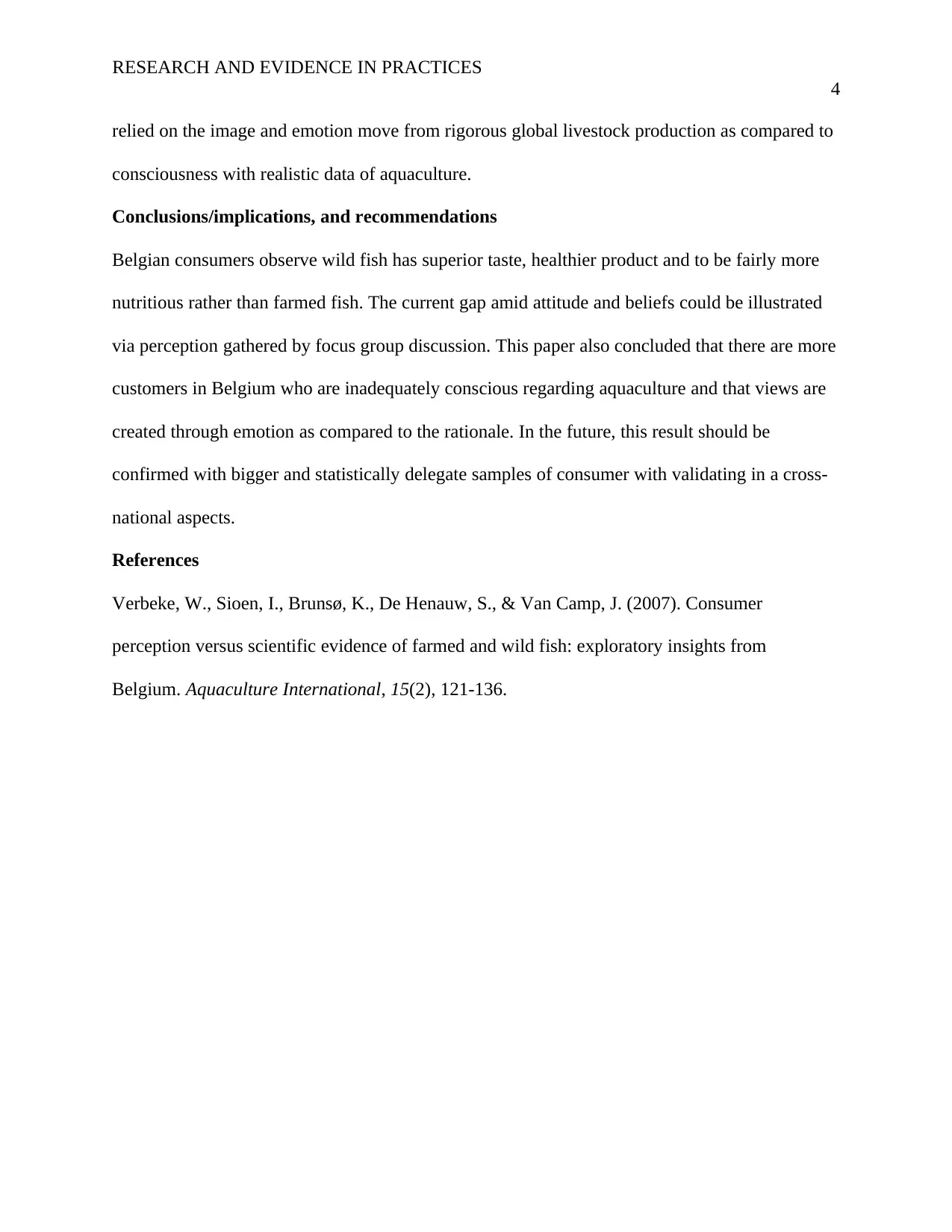
RESEARCH AND EVIDENCE IN PRACTICES
4
relied on the image and emotion move from rigorous global livestock production as compared to
consciousness with realistic data of aquaculture.
Conclusions/implications, and recommendations
Belgian consumers observe wild fish has superior taste, healthier product and to be fairly more
nutritious rather than farmed fish. The current gap amid attitude and beliefs could be illustrated
via perception gathered by focus group discussion. This paper also concluded that there are more
customers in Belgium who are inadequately conscious regarding aquaculture and that views are
created through emotion as compared to the rationale. In the future, this result should be
confirmed with bigger and statistically delegate samples of consumer with validating in a cross-
national aspects.
References
Verbeke, W., Sioen, I., Brunsø, K., De Henauw, S., & Van Camp, J. (2007). Consumer
perception versus scientific evidence of farmed and wild fish: exploratory insights from
Belgium. Aquaculture International, 15(2), 121-136.
4
relied on the image and emotion move from rigorous global livestock production as compared to
consciousness with realistic data of aquaculture.
Conclusions/implications, and recommendations
Belgian consumers observe wild fish has superior taste, healthier product and to be fairly more
nutritious rather than farmed fish. The current gap amid attitude and beliefs could be illustrated
via perception gathered by focus group discussion. This paper also concluded that there are more
customers in Belgium who are inadequately conscious regarding aquaculture and that views are
created through emotion as compared to the rationale. In the future, this result should be
confirmed with bigger and statistically delegate samples of consumer with validating in a cross-
national aspects.
References
Verbeke, W., Sioen, I., Brunsø, K., De Henauw, S., & Van Camp, J. (2007). Consumer
perception versus scientific evidence of farmed and wild fish: exploratory insights from
Belgium. Aquaculture International, 15(2), 121-136.
Paraphrase This Document
Need a fresh take? Get an instant paraphrase of this document with our AI Paraphraser
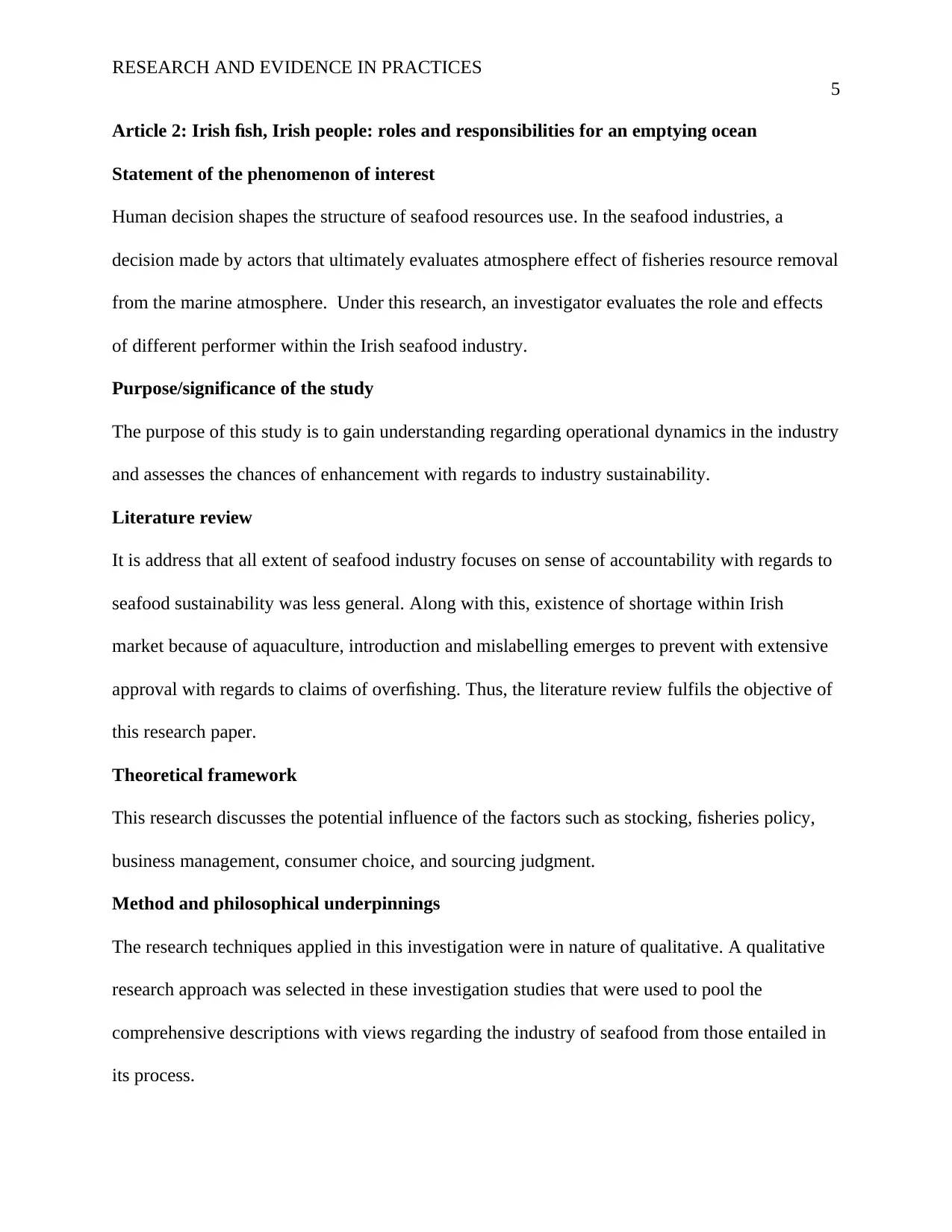
RESEARCH AND EVIDENCE IN PRACTICES
5
Article 2: Irish fish, Irish people: roles and responsibilities for an emptying ocean
Statement of the phenomenon of interest
Human decision shapes the structure of seafood resources use. In the seafood industries, a
decision made by actors that ultimately evaluates atmosphere effect of fisheries resource removal
from the marine atmosphere. Under this research, an investigator evaluates the role and effects
of different performer within the Irish seafood industry.
Purpose/significance of the study
The purpose of this study is to gain understanding regarding operational dynamics in the industry
and assesses the chances of enhancement with regards to industry sustainability.
Literature review
It is address that all extent of seafood industry focuses on sense of accountability with regards to
seafood sustainability was less general. Along with this, existence of shortage within Irish
market because of aquaculture, introduction and mislabelling emerges to prevent with extensive
approval with regards to claims of overfishing. Thus, the literature review fulfils the objective of
this research paper.
Theoretical framework
This research discusses the potential influence of the factors such as stocking, fisheries policy,
business management, consumer choice, and sourcing judgment.
Method and philosophical underpinnings
The research techniques applied in this investigation were in nature of qualitative. A qualitative
research approach was selected in these investigation studies that were used to pool the
comprehensive descriptions with views regarding the industry of seafood from those entailed in
its process.
5
Article 2: Irish fish, Irish people: roles and responsibilities for an emptying ocean
Statement of the phenomenon of interest
Human decision shapes the structure of seafood resources use. In the seafood industries, a
decision made by actors that ultimately evaluates atmosphere effect of fisheries resource removal
from the marine atmosphere. Under this research, an investigator evaluates the role and effects
of different performer within the Irish seafood industry.
Purpose/significance of the study
The purpose of this study is to gain understanding regarding operational dynamics in the industry
and assesses the chances of enhancement with regards to industry sustainability.
Literature review
It is address that all extent of seafood industry focuses on sense of accountability with regards to
seafood sustainability was less general. Along with this, existence of shortage within Irish
market because of aquaculture, introduction and mislabelling emerges to prevent with extensive
approval with regards to claims of overfishing. Thus, the literature review fulfils the objective of
this research paper.
Theoretical framework
This research discusses the potential influence of the factors such as stocking, fisheries policy,
business management, consumer choice, and sourcing judgment.
Method and philosophical underpinnings
The research techniques applied in this investigation were in nature of qualitative. A qualitative
research approach was selected in these investigation studies that were used to pool the
comprehensive descriptions with views regarding the industry of seafood from those entailed in
its process.
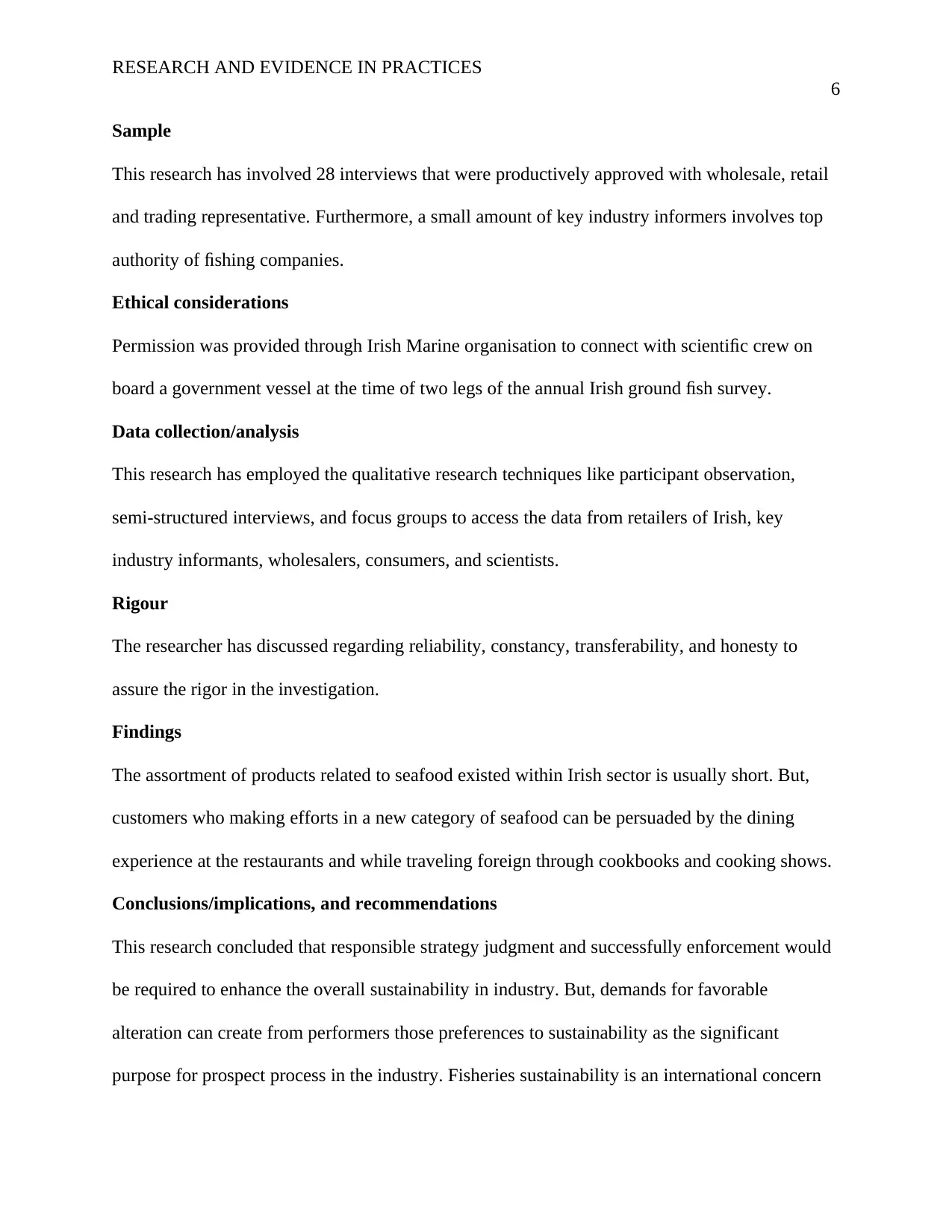
RESEARCH AND EVIDENCE IN PRACTICES
6
Sample
This research has involved 28 interviews that were productively approved with wholesale, retail
and trading representative. Furthermore, a small amount of key industry informers involves top
authority of fishing companies.
Ethical considerations
Permission was provided through Irish Marine organisation to connect with scientific crew on
board a government vessel at the time of two legs of the annual Irish ground fish survey.
Data collection/analysis
This research has employed the qualitative research techniques like participant observation,
semi-structured interviews, and focus groups to access the data from retailers of Irish, key
industry informants, wholesalers, consumers, and scientists.
Rigour
The researcher has discussed regarding reliability, constancy, transferability, and honesty to
assure the rigor in the investigation.
Findings
The assortment of products related to seafood existed within Irish sector is usually short. But,
customers who making efforts in a new category of seafood can be persuaded by the dining
experience at the restaurants and while traveling foreign through cookbooks and cooking shows.
Conclusions/implications, and recommendations
This research concluded that responsible strategy judgment and successfully enforcement would
be required to enhance the overall sustainability in industry. But, demands for favorable
alteration can create from performers those preferences to sustainability as the significant
purpose for prospect process in the industry. Fisheries sustainability is an international concern
6
Sample
This research has involved 28 interviews that were productively approved with wholesale, retail
and trading representative. Furthermore, a small amount of key industry informers involves top
authority of fishing companies.
Ethical considerations
Permission was provided through Irish Marine organisation to connect with scientific crew on
board a government vessel at the time of two legs of the annual Irish ground fish survey.
Data collection/analysis
This research has employed the qualitative research techniques like participant observation,
semi-structured interviews, and focus groups to access the data from retailers of Irish, key
industry informants, wholesalers, consumers, and scientists.
Rigour
The researcher has discussed regarding reliability, constancy, transferability, and honesty to
assure the rigor in the investigation.
Findings
The assortment of products related to seafood existed within Irish sector is usually short. But,
customers who making efforts in a new category of seafood can be persuaded by the dining
experience at the restaurants and while traveling foreign through cookbooks and cooking shows.
Conclusions/implications, and recommendations
This research concluded that responsible strategy judgment and successfully enforcement would
be required to enhance the overall sustainability in industry. But, demands for favorable
alteration can create from performers those preferences to sustainability as the significant
purpose for prospect process in the industry. Fisheries sustainability is an international concern
⊘ This is a preview!⊘
Do you want full access?
Subscribe today to unlock all pages.

Trusted by 1+ million students worldwide
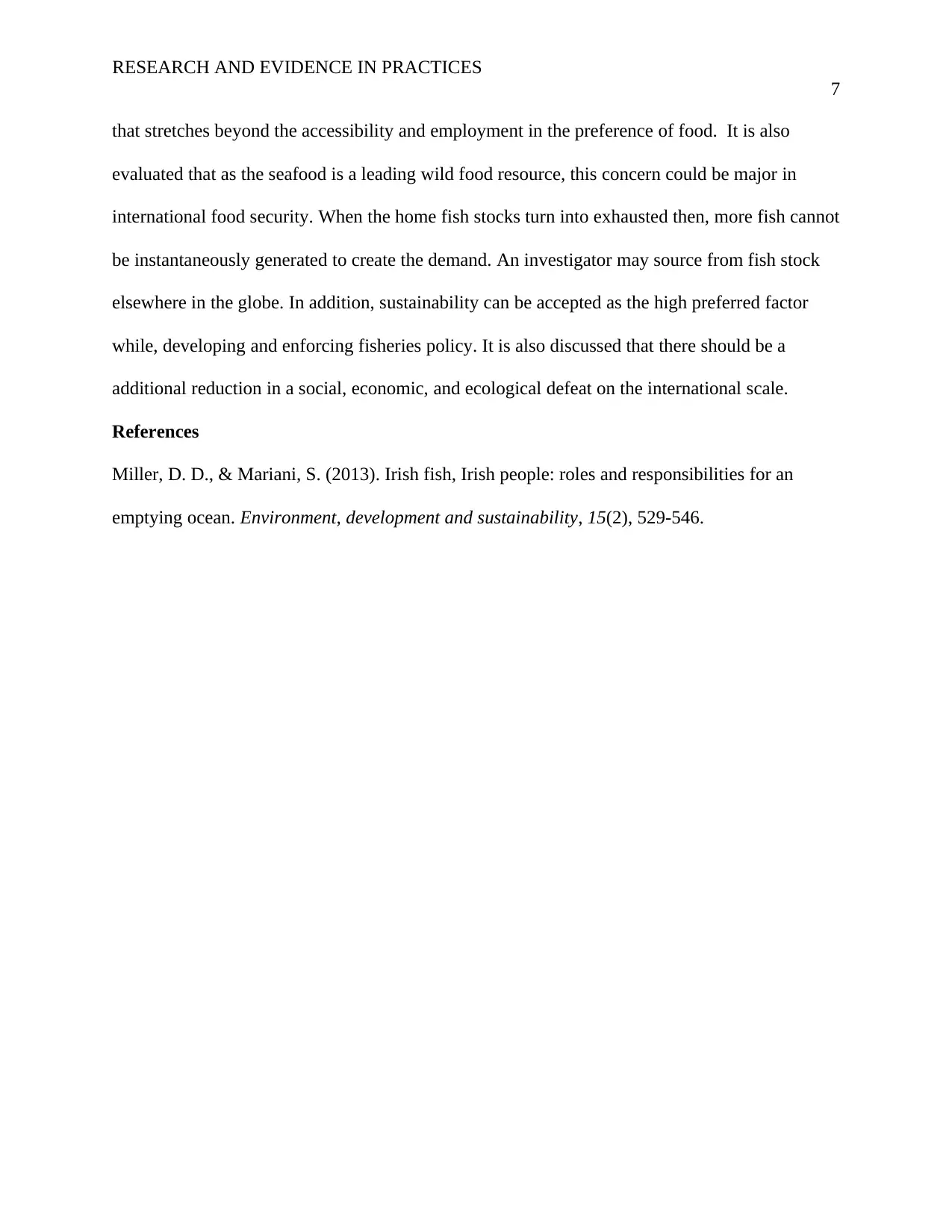
RESEARCH AND EVIDENCE IN PRACTICES
7
that stretches beyond the accessibility and employment in the preference of food. It is also
evaluated that as the seafood is a leading wild food resource, this concern could be major in
international food security. When the home fish stocks turn into exhausted then, more fish cannot
be instantaneously generated to create the demand. An investigator may source from fish stock
elsewhere in the globe. In addition, sustainability can be accepted as the high preferred factor
while, developing and enforcing fisheries policy. It is also discussed that there should be a
additional reduction in a social, economic, and ecological defeat on the international scale.
References
Miller, D. D., & Mariani, S. (2013). Irish fish, Irish people: roles and responsibilities for an
emptying ocean. Environment, development and sustainability, 15(2), 529-546.
7
that stretches beyond the accessibility and employment in the preference of food. It is also
evaluated that as the seafood is a leading wild food resource, this concern could be major in
international food security. When the home fish stocks turn into exhausted then, more fish cannot
be instantaneously generated to create the demand. An investigator may source from fish stock
elsewhere in the globe. In addition, sustainability can be accepted as the high preferred factor
while, developing and enforcing fisheries policy. It is also discussed that there should be a
additional reduction in a social, economic, and ecological defeat on the international scale.
References
Miller, D. D., & Mariani, S. (2013). Irish fish, Irish people: roles and responsibilities for an
emptying ocean. Environment, development and sustainability, 15(2), 529-546.
Paraphrase This Document
Need a fresh take? Get an instant paraphrase of this document with our AI Paraphraser
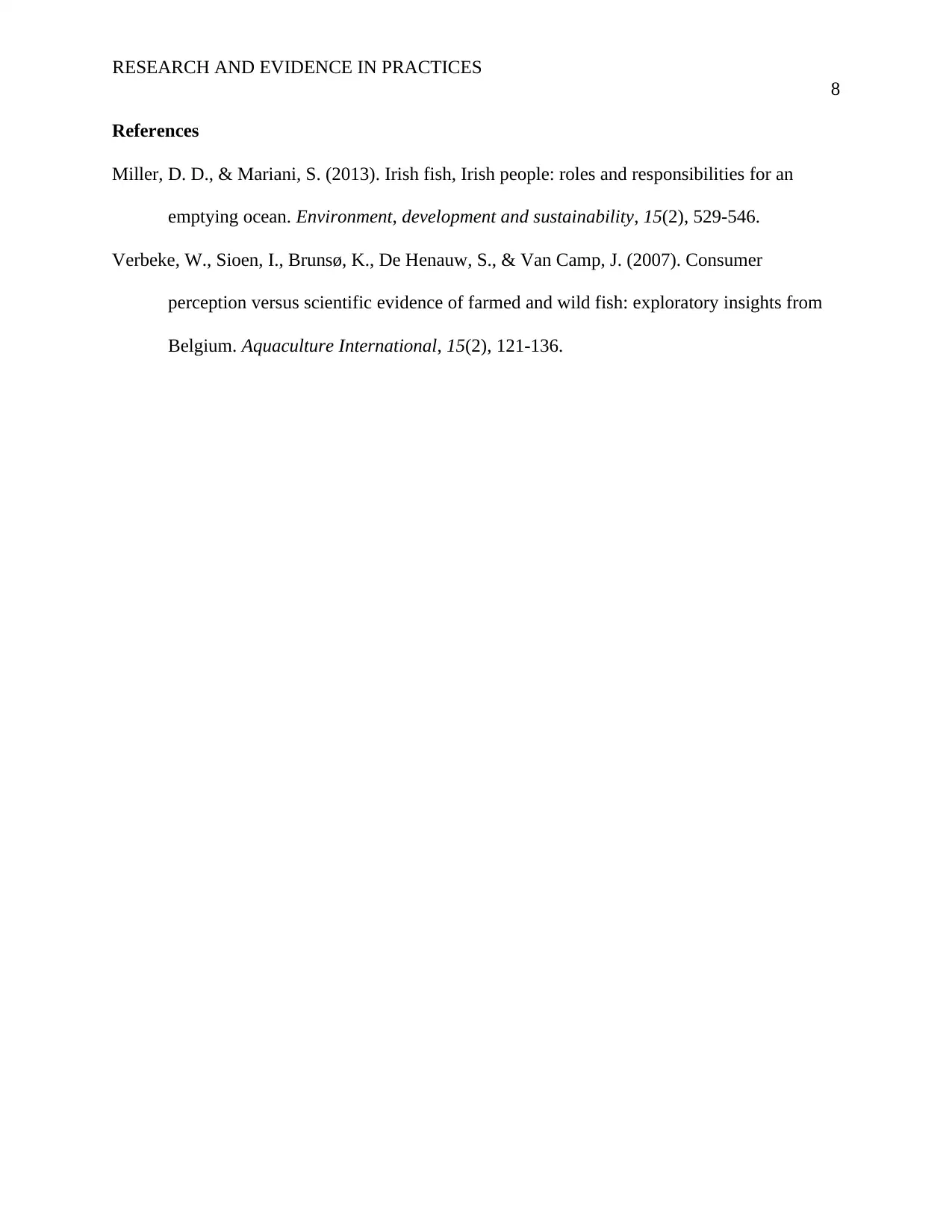
RESEARCH AND EVIDENCE IN PRACTICES
8
References
Miller, D. D., & Mariani, S. (2013). Irish fish, Irish people: roles and responsibilities for an
emptying ocean. Environment, development and sustainability, 15(2), 529-546.
Verbeke, W., Sioen, I., Brunsø, K., De Henauw, S., & Van Camp, J. (2007). Consumer
perception versus scientific evidence of farmed and wild fish: exploratory insights from
Belgium. Aquaculture International, 15(2), 121-136.
8
References
Miller, D. D., & Mariani, S. (2013). Irish fish, Irish people: roles and responsibilities for an
emptying ocean. Environment, development and sustainability, 15(2), 529-546.
Verbeke, W., Sioen, I., Brunsø, K., De Henauw, S., & Van Camp, J. (2007). Consumer
perception versus scientific evidence of farmed and wild fish: exploratory insights from
Belgium. Aquaculture International, 15(2), 121-136.
1 out of 8
Your All-in-One AI-Powered Toolkit for Academic Success.
+13062052269
info@desklib.com
Available 24*7 on WhatsApp / Email
![[object Object]](/_next/static/media/star-bottom.7253800d.svg)
Unlock your academic potential
Copyright © 2020–2026 A2Z Services. All Rights Reserved. Developed and managed by ZUCOL.